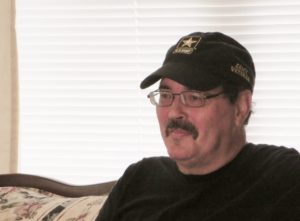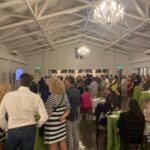
Michael is a U.S. Army veteran. He spent three years in Germany in the early seventies and loved being in the service. Returning to civilian life, though, was tough. “I was deep into drugs,” he remembers. “I was fighting all the time.” His father offered to help him move from Washington DC to North Carolina for a fresh start, and Michael took him up on it. He’s been here for 35 years and worked until chronic back pain forced him to quit his job. When his roommate ran into problems and wasn’t able to pay her half of the rent, he lost his apartment and didn’t have anywhere to go. He slept on an air mattress in his storage unit for five months. When it got too cold to stay there all night, Michael would head to a shelter. “It seemed totally hopeless,” he remembers. But being homeless didn’t deter Michael from working toward his goals. “I was going to school and made sure I kept focused,” he says. “I only missed one assignment in four months.”
Walking through Moore Square one morning, a police officer asked Michael what he had been doing at the shelter. “She asked me if I was homeless,” he said. The officer got Michael connected to Cornerstone Center, a multiservice center for homeless individuals, and he had a temporary place to stay within a few days. “She saved my life,” he says. Michael moved into his CASA apartment in January of this year. “It has given me stability,” he says of his home. “I don’t have to worry about where I’m going to sleep, what I’m going to have to do for food…I don’t have to worry about a thing there.”
Michael lives in a CASA community designated specifically for veterans with disabilities. “We’re always helping each other out,” he says. “The people there are great.” When Michael had surgery a few weeks ago, two neighbors took turns looking in on him while he recovered at home. “CASA has been a lifesaver,” he smiles. “It’s a good community.”
Sometimes Michael still can’t believe how much things have changed since he moved into his CASA apartment. “It was amazing. You think everything’s totally hopeless, you have no goals, no aspirations, no idea what’s gonna happen the next day then all of the sudden everything’s perfect or real close to it.” He especially loves living in a community designated for veterans. “It’s probably the best thing in the world,” he says, “Because if you have a problem….regardless of what you’re going through, someone can relate to it, someone can help guide you through it, people are always there to talk about anything and everything. You have a support network right there and nothing to worry about.”


